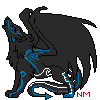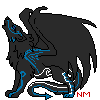Forum rules
Oekaki posts must follow our Rules for the Site and Forum,
including the Oekaki Rules and Art Rules.
Having trouble using oekaki? Check out the Oekaki Guide or send in a help ticket.
Oekaki posts must follow our Rules for the Site and Forum,
including the Oekaki Rules and Art Rules.
Having trouble using oekaki? Check out the Oekaki Guide or send in a help ticket.
Re: Plumerian #573
username;
||Madness||
name;
Kennzu
gender;
Male
personality;
Kennzu is a very calm and stern plumerian. He's the type to show very little to no interest in anything. He never really expresses much emotion and some say he's like a rock, alway so stern and stiff.
response to others;
"yeah, whatever..."
||Madness||
name;
Kennzu
gender;
Male
personality;
Kennzu is a very calm and stern plumerian. He's the type to show very little to no interest in anything. He never really expresses much emotion and some say he's like a rock, alway so stern and stiff.
response to others;
"yeah, whatever..."
Grinsome wrote:
-

Grinsome - Posts: 1040
- Joined: Mon Jun 27, 2011 8:02 am
- My pets
- My items
- My wishlist
- My gallery
- My scenes
- My dressups
- Trade with me
Re: Plumerian #573
- username; dinkleberg
name; Jesse
gender; male!
personality;
response to others;
mark!
- dinkleberg
- Posts: 4988
- Joined: Sat Dec 22, 2012 6:02 am
- My pets
- My items
- My wishlist
- My gallery
- My scenes
- My dressups
- Trade with me
Re: Plumerian #573

username ;;
spencer
name ;;
Gillian
gender ;;
Female
✯✯✯✯✯✯✯
personality ;;
Gillian is snarky, manipulative and smart. While she does associate with other plumies, she also keeps to herself emotionally, although she isn't afraid to fight back if provoked. Gillian is often seen with a book in her hand. She is good at reading people and is perceptive, quite often surmising her friends' true feelings. Gillian often passes her ill judgements onto her friends and her friends take responsibility even though the situation is clearly Gillian's fault. She relies on her friends just as much as they rely on her, but she uses her bossy behavior to hide it all, when she is simply as fragile as any other plumie. Gillian has good survival skills and a good sense of humor when facing problems.
xxx
She never had a good relationship to her parents; her mother worked four jobs and was hardly at home, her father was a washed-up rockstar who she never met until she was 20. Gillian tracked him down and faced bitter disappointment since he didn't show any interest in his daughter. Because of that, she struck up friendships with the wrong people.
response to others ;;
You'll either get a sarcastic or a snarky response from Gillian when you're talking to her as a stranger. It's different when she's talking to friends, though sometimes she's annoyed by her friends and answers their question just like others, in a snarky, sarcastic manner. Most of the time Gillian loves her friends and is happy to talk to them.
spencer
name ;;
Gillian
gender ;;
Female
✯✯✯✯✯✯✯
personality ;;
Gillian is snarky, manipulative and smart. While she does associate with other plumies, she also keeps to herself emotionally, although she isn't afraid to fight back if provoked. Gillian is often seen with a book in her hand. She is good at reading people and is perceptive, quite often surmising her friends' true feelings. Gillian often passes her ill judgements onto her friends and her friends take responsibility even though the situation is clearly Gillian's fault. She relies on her friends just as much as they rely on her, but she uses her bossy behavior to hide it all, when she is simply as fragile as any other plumie. Gillian has good survival skills and a good sense of humor when facing problems.
xxx
She never had a good relationship to her parents; her mother worked four jobs and was hardly at home, her father was a washed-up rockstar who she never met until she was 20. Gillian tracked him down and faced bitter disappointment since he didn't show any interest in his daughter. Because of that, she struck up friendships with the wrong people.
response to others ;;
You'll either get a sarcastic or a snarky response from Gillian when you're talking to her as a stranger. It's different when she's talking to friends, though sometimes she's annoyed by her friends and answers their question just like others, in a snarky, sarcastic manner. Most of the time Gillian loves her friends and is happy to talk to them.

Last edited by spencer on Sat Jul 11, 2015 7:04 am, edited 1 time in total.
- spencer
- Posts: 26846
- Joined: Sat Jun 25, 2011 3:18 am
- My pets
- My items
- My wishlist
- My gallery
- My scenes
- My dressups
- Trade with me
Re: Plumerian #573
- dropped out!! no connection to this gal/guy anymore.
and couldn't finish my form xux
good luck to all!
- justine
Last edited by nyall on Sat Jul 11, 2015 9:26 am, edited 1 time in total.
-

nyall - Posts: 751
- Joined: Tue May 26, 2015 9:33 am
- My pets
- My items
- My wishlist
- My gallery
- My scenes
- My dressups
- Trade with me
Re: Plumerian #573

▬▬▬▬▬▬▬▬▬▬▬▬▬▬▬▬➳
▬▬▬▬▬▬▬▬▬▬▬▬▬▬▬▬➳
Usᴇʀɴᴀᴍᴇ|| Tᴀʀᴛ (ɴᴏɴᴏᴡɴᴇʀ)
Fᴜʟʟ Nᴀᴍᴇ|| Tᴀᴠᴠɪ Pᴇʀᴄɪᴠᴀʟ Tᴀʟʙᴏᴛ
Gᴇɴᴅᴇʀ|| Mᴀʟᴇ
Pᴇʀsᴏɴᴀʟɪᴛʏ||
response to others;
Last edited by Tart on Tue Jul 07, 2015 3:07 am, edited 8 times in total.
-

Tart - Posts: 4303
- Joined: Tue Mar 18, 2014 12:49 pm
- My pets
- My items
- My wishlist
- My gallery
- My scenes
- My dressups
- Trade with me
-

Shandelion. - Posts: 7943
- Joined: Fri Jul 26, 2013 9:53 am
- My pets
- My items
- My wishlist
- My gallery
- My scenes
- My dressups
- Trade with me
Re: Plumerian #573
I’ll try, but I’m never good at finishing forms. x3
username; MerrySandwich
name; Kyo Zugaikotsu
gender; Male
personality; Kyo likes change, travel, and new experiences. Kyo hates injustice, and will go out of his way to solve to problems that he sees. Kyo is very creative and determined, he works intensely to carry out his plans. Though he has limitless enthusiasm for new trips, and ideas, he loses interest quickly once things become routine, as he dislikes being forced to attend to detail, and do boring or repetitive work. Kyo’s lack of patience and organization and his tendency to act impulsively can lead him getting into bad situations, or to accidents, particularly to the head. This includes but is not limited to: him falling off of things, him jumping off of things, him bumping into people, him bumping into things, and him being hit or pushed for a badly thought out remark. This fact is also most likely the reason he can’t seem to recall his past at all.
response to others; WIP
username; MerrySandwich
name; Kyo Zugaikotsu
gender; Male
personality; Kyo likes change, travel, and new experiences. Kyo hates injustice, and will go out of his way to solve to problems that he sees. Kyo is very creative and determined, he works intensely to carry out his plans. Though he has limitless enthusiasm for new trips, and ideas, he loses interest quickly once things become routine, as he dislikes being forced to attend to detail, and do boring or repetitive work. Kyo’s lack of patience and organization and his tendency to act impulsively can lead him getting into bad situations, or to accidents, particularly to the head. This includes but is not limited to: him falling off of things, him jumping off of things, him bumping into people, him bumping into things, and him being hit or pushed for a badly thought out remark. This fact is also most likely the reason he can’t seem to recall his past at all.
response to others; WIP
Last edited by merry! on Tue Jul 07, 2015 7:15 am, edited 1 time in total.
if you were looking for a sign, this is it.
this is your closure.
this is your closure.
- merry!
- Posts: 3613
- Joined: Fri Nov 30, 2012 1:19 am
- My pets
- My items
- My wishlist
- My gallery
- My scenes
- My dressups
- Trade with me
Re: Plumerian #573
username;
name;
gender;
personality;
response to others;
Wip
name;
gender;
personality;
response to others;
Wip
-

vulpes vulpes - Posts: 7824
- Joined: Thu Aug 14, 2014 2:01 am
- My pets
- My items
- My wishlist
- My gallery
- My scenes
- My dressups
- Trade with me
Re: Plumerian #573
Username
WolfSorrow86
Name
Ramsey
Gender
Male
Personality
Ramsey is a cocky and stubborn
young plumerian. He declares
himself better than most, if
not, greater than all. He is very
self-confident and isn't afraid
to start up an unnecessary
arguement. But sometimes,
Ramsey does like to chill out
alone.
Response to Others
Ramsey's response to others is
neutral. Most of the time, he
ignores people whom attempt
to strike up a conversation.
This rude behavior lowers his
reputation and makes himself
appear unapproachable and bleak.
To those who are related to him,
Ramsey respects them and doesn't
talk back, afraid of harsh consequences.
WolfSorrow86
Name
Ramsey
Gender
Male
Personality
Ramsey is a cocky and stubborn
young plumerian. He declares
himself better than most, if
not, greater than all. He is very
self-confident and isn't afraid
to start up an unnecessary
arguement. But sometimes,
Ramsey does like to chill out
alone.
Response to Others
Ramsey's response to others is
neutral. Most of the time, he
ignores people whom attempt
to strike up a conversation.
This rude behavior lowers his
reputation and makes himself
appear unapproachable and bleak.
To those who are related to him,
Ramsey respects them and doesn't
talk back, afraid of harsh consequences.






























-

ardentsongbird - Posts: 5672
- Joined: Sun Aug 18, 2013 8:37 am
- My pets
- My items
- My wishlist
- My gallery
- My scenes
- My dressups
- Trade with me
Re: Plumerian #573
username; Softballpup12
name; Tyler
gender; Male
personality;
Credit to http://www.16personalities.com
INTJ PERSONALITY (473 Words)
- MIND -
ExtravertedIntroverted
100%
- ENERGY -
IntuitiveObservant
84%
- NATURE -
ThinkingFeeling
20%
- TACTICS -
JudgingProspecting
47%
- IDENTITY -
AssertiveTurbulent
47%
INTJ PERSONALITY AND EMOTIONS
INTJs are defined by their confidence, logic, and exceptional decision-making, but all of this hides a turbulent underbelly – their emotions. The very notion of emotional expression is synonymous with irrationality and weakness to many INTJs, a display of poor self-governance and fleeting opinion that can hardly stand up to the enduring light of factual truth.
This mistrust of emotions is understandable, as Feeling (F) is the most weakly developed trait for INTJs – like any complex tool, skilled hands can use it to remarkable effect, while untrained hands make clumsy and dangerous work.
People with the INTJ personality type take pride in remaining rational and logical at all times, considering honesty and straightforward information to be paramount to euphemisms and platitudes in almost all circumstances. In many ways though, these qualities of coolness and detachment aren't the weapons of truth that they appear to be, but are instead shields designed to protect the inner emotions that INTJs feel. In fact, because their emotions are such an underdeveloped tool, INTJs often feel them more strongly than many overtly emotional types because they simply haven't learned how to control them effectively.
There Is Not a Truth Existing Which I Fear
This is a challenging paradigm for INTJs to manage, especially younger and more Turbulent types who are already less confident than they would like to appear. These feelings are contrary to INTJs' idea of themselves as paragons of logic and knowledge, and they may go so far as to claim they have no emotions at all. This does not mean that people with the INTJ personality type should be seen as, nor should they aspire to be, cold-blooded and insensitive geniuses living by the mantra that emotions are for the weak. INTJs must understand that this isn't the case, and isn't ever going to be.
More mature and Assertive INTJs find more useful ways to manage their feelings. While they will never be comfortable with a truly public display of emotions, INTJs can learn to use them, to channel them alongside their logic to help them achieve their goals. While seemingly contradictory, this can be done in several ways.
Firstly, INTJs are goal-oriented, with long-term ideas founded on sound logic. When something does cause an emotional reaction, good or bad, that energy can be used to further those goals, aiding rational and pre-determined plans. Secondly, emotions are figurative canaries in the coal mine, indicating that something is off even though logic can't see it yet. These feelings can help INTJs to use their logic to ask questions they may not have thought to ask. "This is upsetting. Why? What can be done to resolve it?"
Question With Boldness
In this way, emotions are not INTJs' way of addressing a decision, but rather an indication that a decision needs to be addressed. INTJ personalities' Thinking (T) trait acts as a protective big brother to their Feeling (F) trait – seeing that something has upset the less able sibling, it steps in to take action, letting logic do the talking and resolving the condition rather than complaining about its consequences.
There comes a time though, when logic is simply the wrong tool for the job, when there just isn't a rational solution to a problem, and it is in these situations that INTJs must use their Feeling (F) trait most clearly. INTJs would do well to practice this from time to time, or at least be aware of it, because however they may try, it is impossible to truly separate emotion from the decision-making process. The fact is that INTJs do feel, and deeply, and this makes them better, not worse.
response to others;
Credit to http://www.personalitypage.com
Lovers
INTJs live much of their lives inside their own heads. They constantly scan their environment for new ideas and theories which they can turn into plans and structures. Sometimes, what they see and understand intuitively within themselves is more pure and "perfect" than the reality of a close personal relationship. INTJs may have a problem reconciling their reality with their fantasy.
INTJs are not naturally in tune with their own feelings, or with what other people are feeling. They also have a tendency to believe that they are always right. While their self-confidence and esteem is attractive, their lack of sensitivity to others can be a problem if it causes them to inadvertantly hurt their partner's feelings. If this is a problem for an INTJ, they should remember to sometimes let their mate be the one who is right, and to try to be aware of the emotional effect that your words have upon them. In conflict situations, INTJs need to remember to be supportive to their mate's emotional needs, rather than treating the conflict as if it is an interesting idea to analyze.
INTJs are able to leave relationships when they're over, and get on with their lives. They believe that this is the right thing to do. They may have more difficulty accomplishing the task than they like to exhibit to other people.
INTJs are highly intense, intelligent people who bring a lot of depth and insight into most major areas of their life. In terms of relationships, their greatest potential pitfall is the tendency to think about things rather than doing them, and their difficulty reconciling reality with their inner visions. INTJs are likely to be in positive, healthy relationships, because they're likely to leave relationships which aren't working for them (unless other circumstances prohibit that).
Although two well-developed individuals of any type can enjoy a healthy relationship, the INTJ's natural partner is the ENFP, or the ENTP. INTJ's dominant function of Introverted Intuition is best matched with a partner whose personality is dominated by Extraverted Intuition. How did we arrive at this?
Parents
As parents, INTJ's main goal is to raise their children to be intelligent, autonomous and independent. They want their kids to think for themselves and make their own decisions, and so are likely to give them room to grow, and to challenge their decisions and thoughts at key points in their lives.
The INTJ is not naturally likely to be an overly supportive or loving parental figure. Since their own need for expressions of love and affirmation is relatively low, they may have difficulty seeing that need in their children who have Feeling preferences. If they do see this sensitivity, they may not recognize or value the importance of feeding it. In such situations, there will be a distance between the INTJ and the child. This is a problem area for the INTJ, who should consciously remember to be aware of others' emotional needs.
Friends
INTJs are usually difficult to get to know well, and difficult to get close to. Those who are close to the INTJ will highly value them for their ideas and knowledge. Although INTJs are generally very serious-minded people, they also have been known to enjoy letting loose and having fun, if others pull them into it. They also can be really good at telling jokes, and exhibiting a sarcastic wit with a poker face.
The INTJ is not likely to choose to spend time with people who they feel don't have anything to offer the INTJ. They especially like to spend time with other Intuitive Thinkers, and also usually enjoy the company of Intuitive Feelers. These personality types love to theorize and speculate about ideas, and so can usually relate well to the INTJ, who loves to analyze ideas.
Many INTJs believe that they are always right. In some INTJs, this belief is quite obvious, while in others it is more subtle. Some people may have a difficult time accepting what they see as a "superior attitude" or "snobbery". Not to imply that INTJs are snobbish, just that some people with strong Feeling preferences may perceive them that way. And some individuals simply have no interest in the theoretical pursuits which the INTJ enjoys.
name; Tyler
gender; Male
personality;
Credit to http://www.16personalities.com
INTJ PERSONALITY (473 Words)
- MIND -
ExtravertedIntroverted
100%
- ENERGY -
IntuitiveObservant
84%
- NATURE -
ThinkingFeeling
20%
- TACTICS -
JudgingProspecting
47%
- IDENTITY -
AssertiveTurbulent
47%
INTJ PERSONALITY AND EMOTIONS
INTJs are defined by their confidence, logic, and exceptional decision-making, but all of this hides a turbulent underbelly – their emotions. The very notion of emotional expression is synonymous with irrationality and weakness to many INTJs, a display of poor self-governance and fleeting opinion that can hardly stand up to the enduring light of factual truth.
This mistrust of emotions is understandable, as Feeling (F) is the most weakly developed trait for INTJs – like any complex tool, skilled hands can use it to remarkable effect, while untrained hands make clumsy and dangerous work.
People with the INTJ personality type take pride in remaining rational and logical at all times, considering honesty and straightforward information to be paramount to euphemisms and platitudes in almost all circumstances. In many ways though, these qualities of coolness and detachment aren't the weapons of truth that they appear to be, but are instead shields designed to protect the inner emotions that INTJs feel. In fact, because their emotions are such an underdeveloped tool, INTJs often feel them more strongly than many overtly emotional types because they simply haven't learned how to control them effectively.
There Is Not a Truth Existing Which I Fear
This is a challenging paradigm for INTJs to manage, especially younger and more Turbulent types who are already less confident than they would like to appear. These feelings are contrary to INTJs' idea of themselves as paragons of logic and knowledge, and they may go so far as to claim they have no emotions at all. This does not mean that people with the INTJ personality type should be seen as, nor should they aspire to be, cold-blooded and insensitive geniuses living by the mantra that emotions are for the weak. INTJs must understand that this isn't the case, and isn't ever going to be.
More mature and Assertive INTJs find more useful ways to manage their feelings. While they will never be comfortable with a truly public display of emotions, INTJs can learn to use them, to channel them alongside their logic to help them achieve their goals. While seemingly contradictory, this can be done in several ways.
Firstly, INTJs are goal-oriented, with long-term ideas founded on sound logic. When something does cause an emotional reaction, good or bad, that energy can be used to further those goals, aiding rational and pre-determined plans. Secondly, emotions are figurative canaries in the coal mine, indicating that something is off even though logic can't see it yet. These feelings can help INTJs to use their logic to ask questions they may not have thought to ask. "This is upsetting. Why? What can be done to resolve it?"
Question With Boldness
In this way, emotions are not INTJs' way of addressing a decision, but rather an indication that a decision needs to be addressed. INTJ personalities' Thinking (T) trait acts as a protective big brother to their Feeling (F) trait – seeing that something has upset the less able sibling, it steps in to take action, letting logic do the talking and resolving the condition rather than complaining about its consequences.
There comes a time though, when logic is simply the wrong tool for the job, when there just isn't a rational solution to a problem, and it is in these situations that INTJs must use their Feeling (F) trait most clearly. INTJs would do well to practice this from time to time, or at least be aware of it, because however they may try, it is impossible to truly separate emotion from the decision-making process. The fact is that INTJs do feel, and deeply, and this makes them better, not worse.
response to others;
Credit to http://www.personalitypage.com
Lovers
INTJs live much of their lives inside their own heads. They constantly scan their environment for new ideas and theories which they can turn into plans and structures. Sometimes, what they see and understand intuitively within themselves is more pure and "perfect" than the reality of a close personal relationship. INTJs may have a problem reconciling their reality with their fantasy.
INTJs are not naturally in tune with their own feelings, or with what other people are feeling. They also have a tendency to believe that they are always right. While their self-confidence and esteem is attractive, their lack of sensitivity to others can be a problem if it causes them to inadvertantly hurt their partner's feelings. If this is a problem for an INTJ, they should remember to sometimes let their mate be the one who is right, and to try to be aware of the emotional effect that your words have upon them. In conflict situations, INTJs need to remember to be supportive to their mate's emotional needs, rather than treating the conflict as if it is an interesting idea to analyze.
INTJs are able to leave relationships when they're over, and get on with their lives. They believe that this is the right thing to do. They may have more difficulty accomplishing the task than they like to exhibit to other people.
INTJs are highly intense, intelligent people who bring a lot of depth and insight into most major areas of their life. In terms of relationships, their greatest potential pitfall is the tendency to think about things rather than doing them, and their difficulty reconciling reality with their inner visions. INTJs are likely to be in positive, healthy relationships, because they're likely to leave relationships which aren't working for them (unless other circumstances prohibit that).
Although two well-developed individuals of any type can enjoy a healthy relationship, the INTJ's natural partner is the ENFP, or the ENTP. INTJ's dominant function of Introverted Intuition is best matched with a partner whose personality is dominated by Extraverted Intuition. How did we arrive at this?
Parents
As parents, INTJ's main goal is to raise their children to be intelligent, autonomous and independent. They want their kids to think for themselves and make their own decisions, and so are likely to give them room to grow, and to challenge their decisions and thoughts at key points in their lives.
The INTJ is not naturally likely to be an overly supportive or loving parental figure. Since their own need for expressions of love and affirmation is relatively low, they may have difficulty seeing that need in their children who have Feeling preferences. If they do see this sensitivity, they may not recognize or value the importance of feeding it. In such situations, there will be a distance between the INTJ and the child. This is a problem area for the INTJ, who should consciously remember to be aware of others' emotional needs.
Friends
INTJs are usually difficult to get to know well, and difficult to get close to. Those who are close to the INTJ will highly value them for their ideas and knowledge. Although INTJs are generally very serious-minded people, they also have been known to enjoy letting loose and having fun, if others pull them into it. They also can be really good at telling jokes, and exhibiting a sarcastic wit with a poker face.
The INTJ is not likely to choose to spend time with people who they feel don't have anything to offer the INTJ. They especially like to spend time with other Intuitive Thinkers, and also usually enjoy the company of Intuitive Feelers. These personality types love to theorize and speculate about ideas, and so can usually relate well to the INTJ, who loves to analyze ideas.
Many INTJs believe that they are always right. In some INTJs, this belief is quite obvious, while in others it is more subtle. Some people may have a difficult time accepting what they see as a "superior attitude" or "snobbery". Not to imply that INTJs are snobbish, just that some people with strong Feeling preferences may perceive them that way. And some individuals simply have no interest in the theoretical pursuits which the INTJ enjoys.
Last edited by Firnen+Saphira on Wed Jul 15, 2015 3:01 am, edited 4 times in total.
Last edited by Firnen+Saphira on Sat, September 5, 2015 7:18 am, CST, edited ∞ times in total.
____________________________________________________________________________________________
____________________________________________________________________________________________
┏━━━━━━━━┓
ᏢᏞᎬᎪsᎬ ᏒᎬᎪᎠ
I have been cyber bullied
on CS for a bit and am
currently going around the
forums that I think are safe.
I am not going to say why
or how cause many people
will think it's stupid, but,
pm me if you wish to know.
Plumerian Lights: Off
CS lights: Off
MODS: HAYDEN
IS AN ELECTRONIC
NICKNAME! MY
FRIENDS ARE
LEFOXICORNIUS, AND
GUINEAWOLF55!
WE SOMETIMES
USE EACH OTHERS DEVICES
WHILE AT EACH OTHERS
HOUSES!
┗━━━━━━━━┛
ᏢᏞᎬᎪsᎬ ᏒᎬᎪᎠ
I have been cyber bullied
on CS for a bit and am
currently going around the
forums that I think are safe.
I am not going to say why
or how cause many people
will think it's stupid, but,
pm me if you wish to know.
Plumerian Lights: Off
CS lights: Off
MODS: HAYDEN
IS AN ELECTRONIC
NICKNAME! MY
FRIENDS ARE
LEFOXICORNIUS, AND
GUINEAWOLF55!
WE SOMETIMES
USE EACH OTHERS DEVICES
WHILE AT EACH OTHERS
HOUSES!
┗━━━━━━━━┛
-

Firnen+Saphira - Posts: 4167
- Joined: Sat May 16, 2015 4:04 am
- My pets
- My items
- My wishlist
- My gallery
- My scenes
- My dressups
- Trade with me
Who is online
Users browsing this forum: Sashtato and 11 guests












